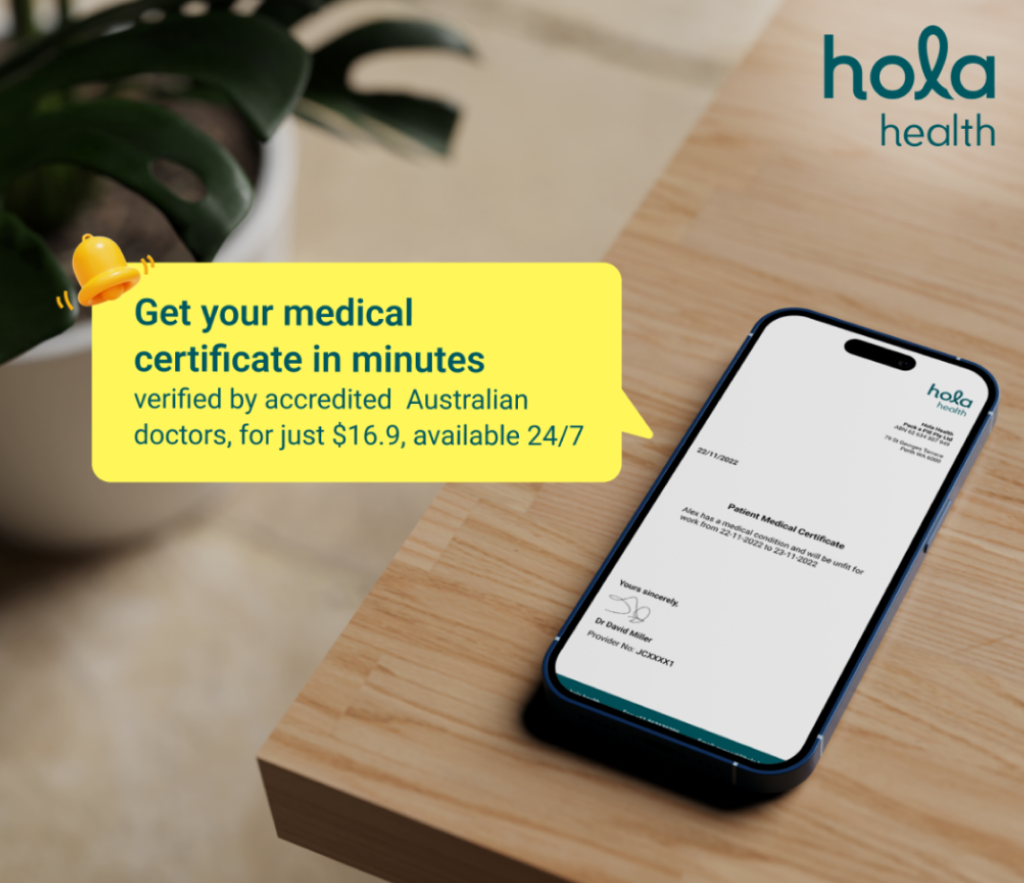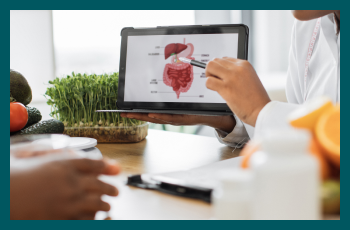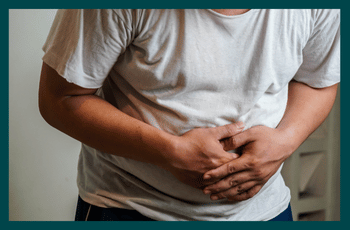Bloating Treatment
Access AHPRA-accredited online doctors or health practitioners 24/7 and seek immediate medical advice within 15 minutes for bloating.
About bloating

Medically reviewed by Dr. Ammar AL-ANI, MBChB, CCBST, AMC
When to consult a doctor for bloating?
- Bloating lasts more than a few days or happens regularly
- You experience severe abdominal pain or cramping
- You notice sudden or unexplained weight loss
- There are changes in your bowel habits like constipation or diarrhoea
- You have blood in your stool or ongoing nausea and vomiting
- You feel bloated even after small meals
- You’re over 50 and experiencing new digestive symptoms
Why am I so bloated?
Feeling bloated can be frustrating, especially when it seems to happen out of nowhere. It’s usually caused by excess gas, fluid retention, or slow digestion, but the exact reason can vary from person to person.
Some of the most common causes include:
- Overeating or eating too quickly
- Swallowing air while chewing gum or drinking fizzy drinks
- High-fibre or gas-producing foods such as beans, cabbage, onions
- Constipation
- Food intolerances, like lactose intolerance or gluten sensitivity
- Irritable Bowel Syndrome (IBS)
- Hormonal changes, such as PMS or early pregnancy
- Stress and anxiety, which can affect digestion
What are the causes of bloating?
Bloating is a common digestive complaint which can result from various underlying causes. Understanding what’s triggering your bloating is key to managing it effectively.
Here are some of the most common causes:
- Dietary choices: Eating too much, too fast, or consuming gas-producing foods like beans, broccoli, onions, and carbonated drinks can lead to bloating.
- Food intolerances: Lactose (dairy), fructose, and gluten are common triggers that can cause gas, bloating, and discomfort in sensitive individuals.
- Constipation: When stool builds up in the colon, it can cause bloating and abdominal pressure.
- Irritable Bowel Syndrome (IBS): A chronic condition affecting bowel function, often associated with bloating, gas, and irregular bowel movements.
- Hormonal changes: Many people experience bloating around menstruation due to fluid retention and hormonal shifts.
- Stress and anxiety: These can slow digestion and lead to abdominal tension and bloating.
- Medical conditions: Coeliac disease, gastroparesis (paralysis of the stomach), and even ovarian issues can sometimes present with bloating.
What are the symptoms of bloating?
- A feeling of fullness or tightness in the abdomen, even if you haven’t eaten much
- Visible abdominal swelling or distension, where your belly appears puffier than usual
- Excessive gas or flatulence
- Burping or belching
- Cramping or abdominal pain, which may come and go
- Gurgling or rumbling noises in the stomach
- Nausea or loss of appetite
- Discomfort that worsens after meals
How to get rid of bloating?
Here are some practical steps you can take to relieve bloating:
- Eat slowly and mindfully: Eating too quickly causes you to swallow air, which can lead to gas and bloating.
- Avoid carbonated drinks: Fizzy beverages introduce extra gas into your digestive system.
- Limit foods that cause gas: Beans, lentils, cabbage, onions, and artificial sweeteners are common culprits.
- Increase fibre gradually: A sudden increase in fibre can worsen bloating, so go slow and stay hydrated.
- Stay active: Light exercise, such as walking, helps stimulate digestion and reduce gas build-up.
- Try peppermint tea or capsules: Peppermint can relax your gut muscles and ease digestive discomfort.
- Use over-the-counter remedies: Antacids or simethicone-based products may help relieve symptoms temporarily.
What relieves bloating fast?
If you’re looking for fast relief from bloating, there are several quick and effective strategies you can try from home. Here’s what can help relieve bloating quickly:
- Go for a gentle walk: Light movement can help your digestive system release trapped gas.
- Try peppermint tea: Peppermint relaxes the gut and can ease bloating within minutes.
- Use a heat pack: Applying warmth to your abdomen helps reduce cramping and pressure.
- Sip warm water with lemon or ginger: These natural remedies support digestion and reduce discomfort.
- Avoid lying down immediately after eating: Stay upright to help food pass through your digestive system.
- Take over-the-counter remedies: Products containing simethicone or activated charcoal can relieve gas buildup quickly.
How can I speak to an online doctor to get medical advice for bloating?
You can gain access to registered telehealth doctors from the comfort of your home, 24/7, using Hola Health. Consult an online doctor in Australia by clicking on telehealth consultations. Choose the consultation type, fill in your details and make the payment. Speak to a licensed health practitioner within 15 minutes and discuss your condition. Along with medical advice, if necessary, you might receive online prescriptions, medical certificates in Australia and online GP referrals.
Can I get an online prescription through telehealth?
Telehealth in Australia helps you speak to an online doctor regarding your medical condition and getting an instant script online if necessary. To get a script online, here’s a step-by-step guide:
- Click on online scripts in Hola Health website or app
- Click on request an instant script and choose the type of script you need
- Fill in your details and make payment.
- A registered doctor will review your request over an instant consult and discuss your symptoms, medical history, and treatment options.
- If the doctor deems it necessary, they will issue an online prescription via SMS within minutes.
Can you get a medical certificate online for bloating?
Yes. Through a telehealth appointment, you can explain your symptoms like abdominal discomfort, pain, nausea, or fatigue. If the doctor agrees it’s affecting your ability to work, study, or carry out daily tasks, they can issue an official online medical certificate.
What type of referrals can I get online through telehealth?
Using telehealth services, you can get an online referral to specialists such as a gastroenterologist, a gynaecologist or any other specialist referral. You can get diagnostic test referrals such as blood tests, pathology tests or radiology scans.
Can I see a night doctor for bloating through Hola Health?
Yes, you can consult a night doctor for bloating through Hola Health. Their after-hours telehealth service connects you with Australian-registered doctors 24/7, including evenings, weekends, and public holidays. Appointments are typically available within 15 minutes, making it convenient to address non-emergency concerns like bloating at any time.
How can we help?
Hola Health’s 24/7 telehealth service connects you with a registered health practitioner within 15 minutes. Seek medical advice for most non-emergent conditions, get scripts online, medical certificates, online referrals and more. Here are some telehealth services by Hola Health:
- Telehealth consultations on the go: Speak to an AHPRA-accredited online doctor and get medical advice on most medical conditions.
- Medical certificates: Request a valid medical certificate online for work or school. Get carer’s certificates, multi-day medical certificates for long absences.
- Instant scripts online: Gain access to prescriptions online 24/7 from the comfort of your home.
- Online GP referrals: Request online doctor referrals for specialists, pathology referrals, blood test referrals and radiology referrals.
- Online mental health care plans: Access fully bulk-billed online mental health care plans from the comfort of your home.
Talk to a doctor today
Instantly connect to a registered practitioner within 15 minutes from anywhere in Australia, 24/7 for:
- General consults
- New & repeat scripts
- Referrals
- Medical certificates
- Mental health plans

Read more about bloating
Access telehealth services
Doctors Brisbane | Doctors Melbourne | Doctors Perth | Doctors Sydney | Doctors near me | Doctors Canberra | Doctors Adelaide | Doctors Darwin | Doctors Hobart
After hours Doctor Brisbane | After hours Doctor Melbourne | After hours Doctor Perth | After hours Doctor Sydney | After hours Doctor Hobart | After hours Doctor Gold Coast | After hours Doctor Canberra | After hours Doctor Adelaide | After hours Doctor Darwin | After hours GP | After hours doctor
Medical certificate | Medical certificate online for work | Medical certificate for school | Medical certificate for Uni | Medical certificate for stress | Carer’s leave certificate | Medical certificate NSW | Medical certificate QLD | Medical certificate VIC | Medical certificate WA | Doctors certificate online | Multi-day Certificate | Sick certificate online | GP medical certificate | Doctors note | Telehealth medical certificate | 2-day medical certificate | Medical certificate for sick leave
Instant scripts | eScript | Online prescriptions | Online prescriptions Sydney | Online prescriptions Melbourne | Online prescriptions Perth | Online prescriptions Brisbane | Online Rx prescription
Online referrals | Blood test referral | X-Ray referral | Pathology referral | Radiology referral | Specialist referral | Gynaecologist referral | Audiology referral | Ophthalmologist referral | Paediatrician referral | Ent specialist referral | Endocrinologist referral | Dermatologist referral | Urologist referral | Gastroenterologist referral
Telehealth appointment | Online Doctor | Bulk Billing Doctors | Doctors on-demand | Instant consult | Covid antiviral | Dial a Doctor | Online GP | Doctor appointment | Bulk-billing doctors | Telehealth pricing | GP online chat | Australian doctor | Web doctor | Home doctor | 24-hour doctor















